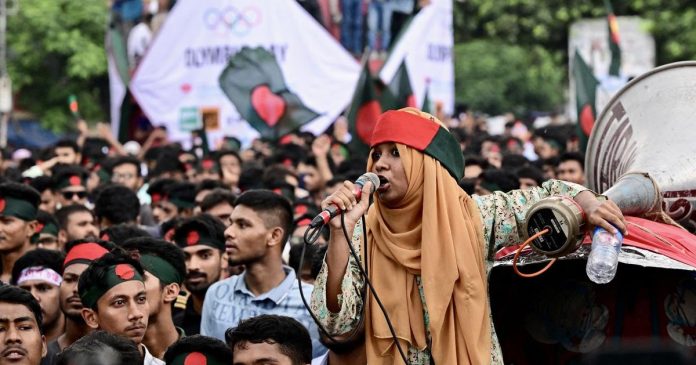16 Jul. 24: On Sunday night, thousands of students marched through the Dhaka University campus, voicing their discontent over a recent High Court ruling that reinstated a controversial quota system for government jobs, reported the Scroll. The protests have disrupted academic activities and daily life in the capital.
The demonstrators chanted a provocative slogan, “Who are you? Who are you? I am Razakar, I am Razakar.” The term “Razakar” refers to those who collaborated with the Pakistani military during Bangladesh’s 1971 liberation war, and is considered highly offensive in the country.
The protests were ignited by comments made by Prime Minister Sheikh Hasina during a press conference earlier that day. She defended the 30% job reservation for descendants of freedom fighters from the 1971 war, which students argue deprives them of equal opportunities. Hasina’s remarks, perceived as dismissive, further fueled the students’ anger.
In her speech, Hasina questioned who would benefit from the quotas if not the grandchildren of freedom fighters. She also highlighted the sacrifices made by these freedom fighters and their role in enabling current freedoms. However, her comments comparing students to “Razakars” were met with outrage.
The government responded swiftly to the protests. Hasina criticized the students for using the term “Razakar” and questioned their understanding of Bangladesh’s history. Education Minister Mohibul Hassan Chowdhury and other officials condemned the protesters, accusing them of disrespecting the sacrifices of the freedom fighters.
Despite the government’s backlash, the protests have continued, with students adapting the iconic Liberation War slogan “Who are we? Bengali!” into “Who are we? Razakar!” to express their frustration. Political analyst Zahed Ur Rahman suggested that the government is using the term “Razakar” to discredit dissenters, a tactic likened to labeling opponents as anti-national.
The protests have marked a significant shift in the public’s view of Hasina, with students for the first time openly referring to her as an “autocrat.” This label has previously been used only by political opponents. The ongoing demonstrations highlight the growing discontent among young job seekers and their demand for equal opportunities in Bangladesh.




